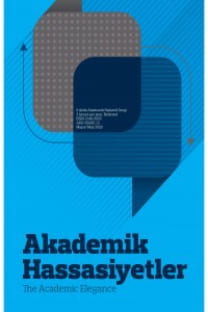KUZEY MAKEDONYA CUMHURİYETİ'NDE HÜKÜMET ÜZERİNDEKİ PARLAMENTO KONTROLÜ
Bir ülkedeki kuvvetler ayrılığı, hala birçok bilim insanı, politikacı, sosyal filozof tarafından tartışılan bir konudur. Kuvvetler ayrılığı sosyal, toplumsal, coğrafi, kültürel, siyasi, tarihsel vb. birçok faktöre bağlıdır. Bu nedenle, bu çalışmanın temel amaçlarından biri, belirli bir ülkede kuvvetler kavramının ve kuvvetler ayrılığının gerçekte neyi temsil ettiğini açıklamaktır. Kuvvetler ve kuvvetler ayrılığı kavramları kısaca tanımlandıktan sonra, Kuzey Makedonya Cumhuriyeti'nde kuvvetler ayrılığının gerçekten uygulamada işleyip işlemediği veya Anayasa, kanunlar ve tüzükler çerçevesinde konulan bir şey olup olmadığı incelenmektedir, yani vatandaşlara demokrasi içinde yaşadıklarını göstermek mi için kağıda yazıp yazılmadığı analiz edilir. Devlet makamları arasında belli bir kontrol, denge ve denetimin olması için kurulan kuvvetler ayrılığına, yani kontrol ve denge sistemine en çok dikkat edilmektedir. Bu sistem, herhangi bir siyasi rejimde demokrasinin kalitesini belirleyen birincil değişken olarak kabul edilebilir. Diğer bir deyişle, yasama organının yürütmenin çalışmalarını denetlemek için sahip olduğu araçları inceler ve daha da önemlisi bunların ne kadar etkili ve verimli olduğunu göstermeye çalışır.
Anahtar Kelimeler:
Assembly, Check and Balance System, Government, Parliamentary Control, Separation of Power
THE PARLIAMENTARY CONTROL OVER THE GOVERNMENT IN THE REPUBLIC OF NORTH MACEDONIA
The separation of power in a country is still a topic on which many scientists, politicians, social philosophers debate. The separation of power depends on many factors, such as social, societal, geographical, cultural, political, historical and so on. Thus, one of the main goal of this study is to explain what the concept of power and the separation of power actually represent in a given country. After briefly defining the concepts of power and separation of power, it is analyzed whether the separation of power in Republic of North Macedonia really works in practice, or it is something put in the framework of Constitution, laws and bylaws, i. e. written on paper, in order to show its citizens that they live in a democracy. The most attention is paid to the separation of power, the so-called check and balance system, which is established in order to have a certain control, balance and supervision between state bodies, could be considered as the primary variable to determine the quality of democracy in any political regime. More specifically, the relationship between the legislative and executive authorities is analyzed. In other words, it examines the means that the legislative authority possesses for control over the work of the executive authority and, more importantly, try to show how much they are effective and efficient.
Keywords:
Assembly, Check and Balance System, Government, Parliamentary Control, Separation of Power,
___
- Assembly of the Republic of North Macedonia. (2022, February 10). Interpellations. Retrieved from https://www.sobranie.mk/materijali.nspx on 20.03.2022.
- Burns, A. I. and Markman, S. J. (1987). Understanding separation of powers. Pace Law Review, 7(3), 574-607.
- Constitution of the Republic of North Macedonia. Davitkovski, B. and Pavlovska-Daneva, A. (2018). Administrative law - first part (substantive law) (third amended edition). Skopje, Republic of North Macedonia: St. Cyril and Methodius University.
- Debard, T. (2002). Dictionaire de droit constitutionnel. Paris, France: Ellippses.
- Foucault, M. (1999). Materialism and education. Westport: Bergin and Garney.
- Gusheva (1997). The politically controlled Assembly of the Republic of Macedonia over the executive power. The Faculty of Law, Skopje, Macedonia.
- Horowitz, L. I. (1967). Power, politics and people, The collected essays of C. Wright Mills, Oxford: Oxford University Press.
- Janevski, D., Korunovska, N., Naumovska, N., Neykov, K., Bogatinovska, S., Milovski, K., Trcoski, A. and Shekerinska, L. (2006). Open society institute foundation – Macedonia. We Study Law. Skopje, Macedonia.
- Jennings, I. (1959). Cabinet Government. Cambridge: Cambridge University Press.
- Kandich, R. T. (2012). Judicial authority in the constitutional and legislative development of Republic of Serbia. Belgrad, Serbia.
- Korunovska-Avramovska, N. (2012). The Parliamentary control over the government in Republic Macedonia. Skopje, Republic of North Macedonia: Open Society Foundation – Macedonia.
- Lowenstein, K. (1957). Political power and government process, Chicago, United States of America.
- Machiavelli, N. (1985). The Prince. Chicago: The University of Chicago Press.
- Marolov, D. and Mitev, O. (2016). Creating an Independent Republic of Macedonia. Internal Situation and Foreign Policy. Shtip: Grin Verlag.
- Markovich, L. (1991). The parliamentary law. Zrenjanin, Serbia: Ekspres.
- Meyerson, D. (2004). The rule of law and the separation of powers. Macquarie Law Journal, 4, 1-6.
- Persson, T., Roland, G. and Tabellini, G. (1997). Separation of powers and political accountability. The Quarterly Journal of Economics, 112(4), 1163-1202.
- Siljanovska-Davkova, G. (2011). Modern “models” of government organization: Dilemmas and challenges. Zbornik PFZ, 365-389.
- Siljanovska-Davkova, G. and Sharikj, S. (2015). The Constitutional law. Skopje, Macedonia: Kultura. State Elections Commission. (2023, March 9). Parliamentary Elections. Retrieved from https://www.sec.mk/izbori/ on 10.03.2023.
- Taseva, S., Markovska Dimov, D., Karai, J. (2016). National integrity system - assessment for Macedonia. Skopje, Republic of North Macedonia: Datapons Skopje.
- Tuntev, A. (2005). Republic of Macedonia first decade (1990-1999). Skopje, Macedonia: MI-AN.
- ISSN: 2148-5933
- Yayın Aralığı: Yılda 3 Sayı
- Başlangıç: 2014
- Yayıncı: A Kitap
Sayıdaki Diğer Makaleler
Süleyman KAHRAMAN, Ahmet ÖZBAY, Behice Zülal AKARCA
TÜKETİCİ ETİĞİ ÖLÇEĞİNİN GEÇERLİLİĞİ
TUKİDİDES TUZAĞI ÇERÇEVESİNDE ABD –ÇİN REKABETİNİN ANALİZİ: TEORİK BİR DEĞERLENDİRME
70. YILINDA TÜRKİYE-NATO İLİŞKİLERİNİN TARİHSEL BOYUTU
SÜRDÜRÜLEBİLİR TÜKETİM DAVRANIŞININ ETKENLERİ: TÜRKİYE'DE Z KUŞAĞI ÜZERİNE BİR SAHA ARAŞTIRMASI
ÜRETİM VE HİZMET İŞLETMELERİNDE ÖRGÜTSEL MUHALEFET ALGISININ ÖLÇÜLMESİ
Can Burak NALBANTOĞLU, Seçil ULUFER KANSOY
MULTIFACETED FINANCIAL DEVELOPMENT AND ECONOMIC GROWTH: BOOTSTRAP PANEL CAUSALITY APPROACH
KUZEY MAKEDONYA CUMHURİYETİ'NDE HÜKÜMET ÜZERİNDEKİ PARLAMENTO KONTROLÜ
